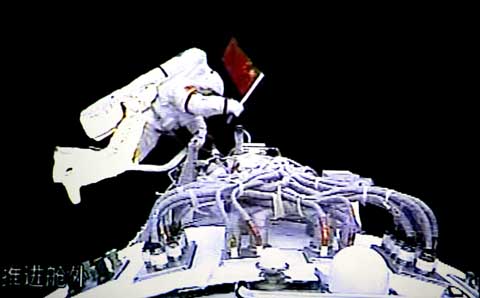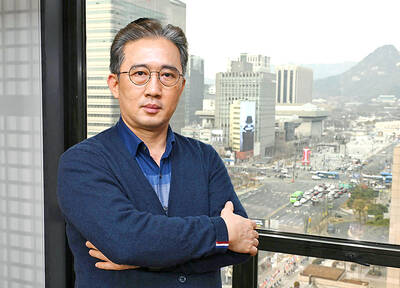A Chinese astronaut on Saturday performed the nation’s first-ever spacewalk, the latest milestone in an ambitious program that is increasingly rivaling the US and Russia in its rapid expansion.
Mission commander Zhai Zhigang (翟志剛), 42, floated out of the orbiter module’s hatch in the spacewalk, shown live on state broadcaster CCTV. Tethered to handles attached to the Shenzhou 7 ship’s orbital module’s exterior, Zhai remained outside for about 13 minutes before climbing back inside and closing the hatch behind him.
“Shenzhou 7 has left the module. I feel well. I am greeting the Chinese people and the people of the world,” Zhai said.

PHOTO: AP
Fellow astronaut Liu Boming (劉柏明) also emerged briefly from the capsule to hand Zhai a Chinese flag that he waved for an exterior camera filming the event. The third crew member, Jing Haipeng (景海鵬), monitored the ship from inside the re-entry module.
Zhai slowly moved toward a test sample of solid lubricant placed outside the orbital module, Xinhua news agency said.
He took the sample and handed it over to Liu who stayed in the orbital module and closely monitored Zhai’s moves.
During his mission, Zhai tested his 120kg, Chinese-made protective suit, which cost US$4 million to US$30 million, various state media reports said.
Zhai returned to the Shenzhou 7’s orbital module, closing its hatch shortly before 5pm, state TV said.
The walk was supposed to last 20 minutes, with no immediate explanation given for the shortened length of time.
Although Zhai’s maneuvers represented the 298th spacewalk of all time, it was a milestone for China. President Hu Jintao (胡錦濤) watched it at the mission control center in Beijing, where applause broke out as Zhai floated out of the spacecraft.
The successful spacewalk paves the way for assembling a space station from two Shenzhou orbital modules, the next major goal of China’s manned spaceflight program. China is also pursuing lunar exploration and may attempt to land a man on the moon in the next decade.
China launched its first manned mission, Shenzhou 5, in 2003, followed by a two-man mission in 2005.
Since blasting off from their northwestern China launch base on Friday, the astronauts had been largely occupied with preparing the suits and adapting to zero gravity. Meals aboard the craft have followed a typical Chinese menu, featuring versions of kung pao chicken, shrimp and dried fruit, Xinhua news agency said.
On Friday, the three-module capsule shifted from an oval orbit to a more stable circular orbit 343km above Earth, meaning it is circling at a constant distance.

VAGUE: The criteria of the amnesty remain unclear, but it would cover political violence from 1999 to today, and those convicted of murder or drug trafficking would not qualify Venezuelan Acting President Delcy Rodriguez on Friday announced an amnesty bill that could lead to the release of hundreds of prisoners, including opposition leaders, journalists and human rights activists detained for political reasons. The measure had long been sought by the US-backed opposition. It is the latest concession Rodriguez has made since taking the reins of the country on Jan. 3 after the brazen seizure of then-Venezuelan president Nicolas Maduro. Rodriguez told a gathering of justices, magistrates, ministers, military brass and other government leaders that the ruling party-controlled Venezuelan National Assembly would take up the bill with urgency. Rodriguez also announced the shutdown

Chinese President Xi Jinping’s (習近平) purge of his most senior general is driven by his effort to both secure “total control” of his military and root out corruption, US Ambassador to China David Perdue said told Bloomberg Television yesterday. The probe into Zhang Youxia (張又俠), Xi’s second-in-command, announced over the weekend, is a “major development,” Perdue said, citing the family connections the vice chair of China’s apex military commission has with Xi. Chinese authorities said Zhang was being investigated for suspected serious discipline and law violations, without disclosing further details. “I take him at his word that there’s a corruption effort under

China executed 11 people linked to Myanmar criminal gangs, including “key members” of telecom scam operations, state media reported yesterday, as Beijing toughens its response to the sprawling, transnational industry. Fraud compounds where scammers lure Internet users into fake romantic relationships and cryptocurrency investments have flourished across Southeast Asia, including in Myanmar. Initially largely targeting Chinese speakers, the criminal groups behind the compounds have expanded operations into multiple languages to steal from victims around the world. Those conducting the scams are sometimes willing con artists, and other times trafficked foreign nationals forced to work. In the past few years, Beijing has stepped up cooperation

The dramatic US operation that deposed Venezuelan president Nicolas Maduro this month might have left North Korean leader Kim Jong-un feeling he was also vulnerable to “decapitation,” a former Pyongyang envoy to Havana said. Lee Il-kyu — who served as Pyongyang’s political counselor in Cuba from 2019 until 2023 — said that Washington’s lightning extraction in Caracas was a worst-case scenario for his former boss. “Kim must have felt that a so-called decapitation operation is actually possible,” said Lee, who now works for a state-backed think tank in Seoul. North Korea’s leadership has long accused Washington of seeking to remove it from power